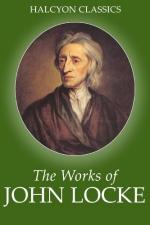
|
| Name: _________________________ | Period: ___________________ |
This quiz consists of 5 multiple choice and 5 short answer questions through Chapters 6-10, pp. 37-73.
Multiple Choice Questions
1. What distinction does Locke make regarding gender and power?
(a) Locke says Adam has control over his wife Eve.
(b) Locke says power lies in the hands of the mother.
(c) Locke says that both Adam and Eve have equal power.
(d) Locke says gender inequalities prevent power equality.
2. What does Locke disagree with Filmer about concerning the rights of the first man in the world?
(a) The right to fight.
(b) The right to governance.
(c) The right to procreate.
(d) The right to acquire property.
3. According to the First Treatise, in whom is power vested?
(a) Adam and descendants.
(b) Locke and his followers.
(c) Filmer and his followers.
(d) King James.
4. In Genesis, when were men and other living creatures created?
(a) When Noak's Ark came ashore.
(b) On different days.
(c) After the apple was eaten.
(d) On the same day.
5. What commandment applies to men and women according to Locke?
(a) Third Commandment.
(b) Fifth Commandment.
(c) Second Commandment.
(d) Sixth Commandment.
Short Answer Questions
1. What quality does Filmer determine that all rulers must possess?
2. What does Filmer call the relationship between a man and his parents?
3. What two things does Filmore say are necessary for absolute monarchy to work?
4. Who has joint dominion over the children in Locke's opinion?
5. What belief, according to Locke, prevents the right to natural freedom?
|
This section contains 301 words (approx. 2 pages at 300 words per page) |

|




